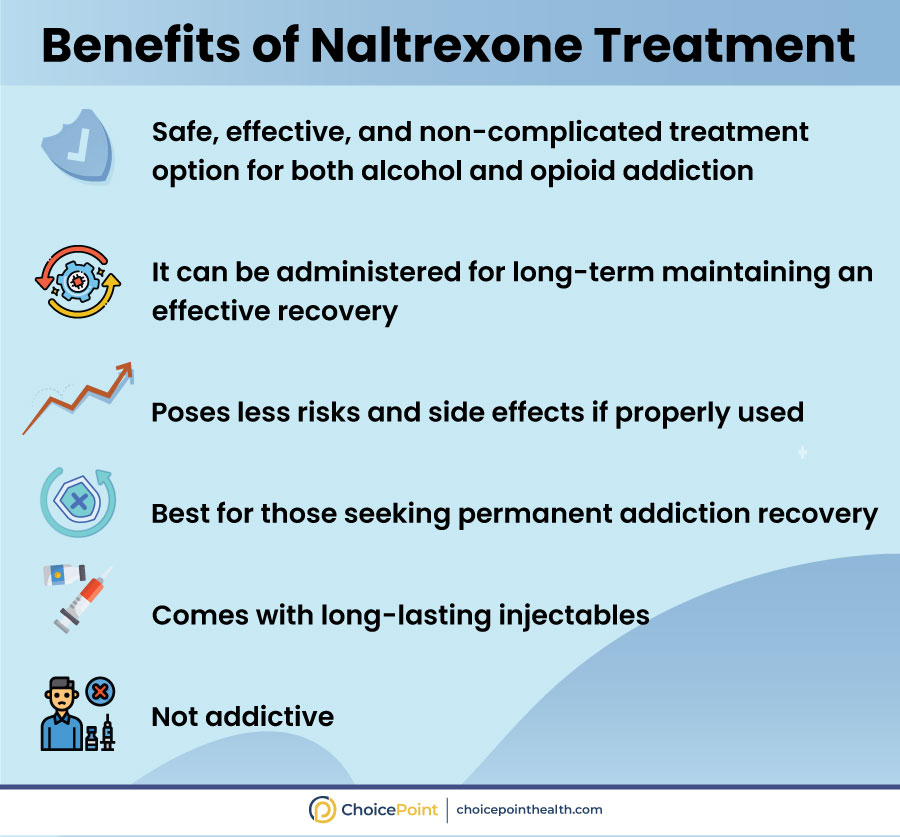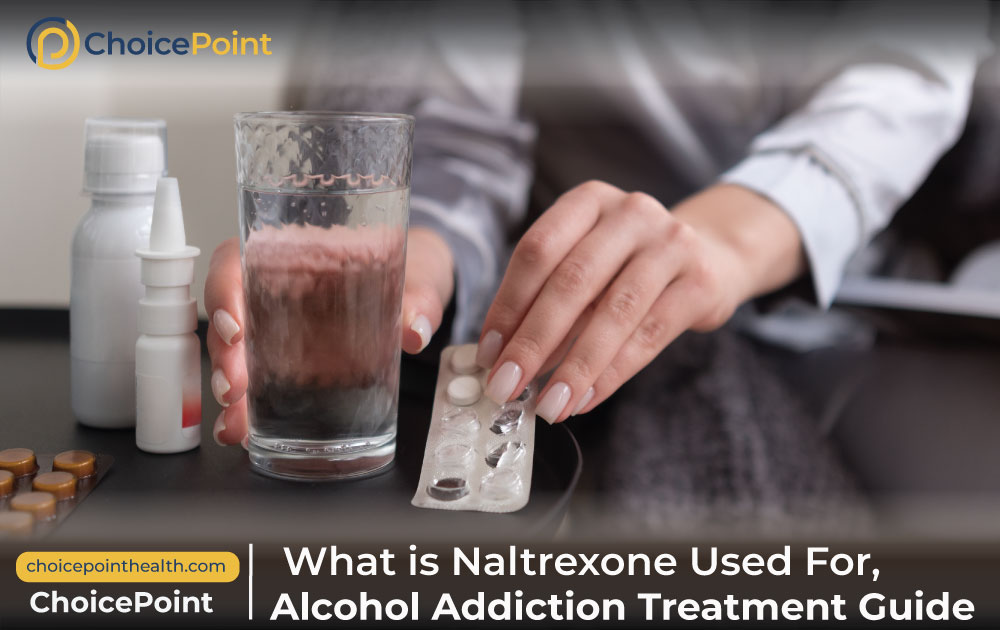Have you ever wondered why your doctors prescribe you naltrexone for AUD? A question arises in your mind: what is naltrexone used for? Well, there could be many reasons, such as naltrexone for pain, alcohol, and opioid addiction, depending on symptoms and severity. A recent survey by KFF revealed that only 46% of people or their family members involved in addiction to prescription painkillers, opioids, and alcohol were able to get addiction treatment.
That is why this blog explains everything regarding naltrexone uses and side effects for people to gain knowledge, awareness, and better outcomes in terms of getting addiction treatment.
ChoicePoint is a HIPAA-compliant addiction treatment center offering FDA-approved MAT for alcohol and opioid addiction, including Naltrexone. Contact 844.445.2563 for appointments!
Table of Contents
What is Naltrexone Used For: Basics of Alcoholism Treatment
Naltrexone is an opioid antagonist that was approved by the FDA in 1984 for medicinal use. Endo Pharmaceutical Company first developed it under the brand name Trexan. Now, in the market, naltrexone is sold under names such as:
- Revia (Pill)
- Depade
- Vivitrol (injectable)
Now, it is used for the treatment of both alcohol use disorder, which was approved in 2006, and opioid use disorder in 2010 due to its safety level and efficacy in dealing with both addictions.
Moreover, research is also underway for its potential use against
- Pain management (low Dose Naltrexone LDN)
- Stimulant use disorder
Since people struggling with alcohol require a medical detox, this medication is helpful in overall alcoholism treatment, which we’ll discuss further.

Did you know? An estimated 10% of all adults in the U.S. are addicted to alcohol or drugs at some point in their lives!.

Did you know? An estimated 10% of all adults in the U.S. are addicted to alcohol or drugs at some point in their lives!
How does Naltrexone Work?
As an opioid antagonist, Naltrexone blocks receptors in the brain, mainly Mu, Kappa, and Delta receptors of the opioid and endorphin receptors, stopping:
- Euphoric and sedative effects associated with alcohol use
- Alcohol craving
- Opioid craving
- Alleviate alcohol withdrawal symptoms
Naltrexone effects can be felt usually within half an hour when administered, but it might take a week to overcome cravings.
When taken orally, naltrexone’s half-life is 4 hours, whereas injectable naltrexone remains in the system for 5-10 days. Clinical observation must be followed during working tenure to avoid side effects!
Side Effects of Naltrexone- Why Expert Help is Necessary
Naltrexone treatment usually lasts for three to four months. However, practitioners should carefully monitor for any side effects, such as:
- Increase in blood pressure
- Abdominal cramps
- Diarrhea
- Insomnia
- Irritability
- Nausea and vomiting
- Rash or hard patch with pain on the skin with injectable naltrexone use
Naltrexone side effects are rare and often less severe, but one should always use it under professional guidance because chronic or improper use may cause severe harm.
Precautions and Risks: When Should You Avoid Taking Naltrexone
It is pertinent to know that naltrexone is not the sole medication for addiction treatment; therefore, unsupervised or unprofessional use may lead to side effects if:
- Someone is allergic to Naltrexone
- Previously or currently using opioids
- Using alcohol
- Having weak or impaired kidney and liver
- They are pregnant or planning to have a pregnancy
- Someone on medications such as disulfiram and thioridazine
- Had any opioid pain medication such as oxycontin, fentanyl, and Vicodin
Always tell your doctors about any underlying condition and be honest; otherwise, things might get worse instead of better if a careful check-up is not maintained before using naltrexone. You can learn from this article how to get an online prescription for naltrexone to get the treatment started.

Benefits of Naltrexone in Addiction Treatment
Treating Alcoholism With Naltrexone Assisted Rehab
Since naltrexone is clinically proven to be an effective medication for alcohol use disorder treatment, it usually starts after a person has stopped alcohol, roughly 3-7 days after the last drink. Alcoholism treatment involves a comprehensive addiction treatment:
Dual Diagnosis- A Comprehensive Plan for Alcoholism Recovery
Alcohol treatment must begin with a comprehensive diagnosis and complete assessment of a person’s SUD history, medical condition, and mental health check-up that includes:
- Rigorous blood testing to facilitate medical reports for checking liver or kidney disease or the presence of opioids or alcohol in the blood.
- Assessing mental health to understand the underlying cause of alcohol misuse.
- Categorizing co-occurring disorders associated with AUD, such as depressive and anxiety disorder, PTSD, and sleep disorder.
Therefore, alcoholism treatment is equipped with a dual diagnosis treatment plan to effectively manage polysubstance use disorder and mental illness associated with alcohol addiction.
Assess Yourself With Our Addiction Test
Sometimes, it is hard to predict whether someone is suffering from alcohol addiction. You can check yourself with our personalized addiction assessment specially designed according to DSM-5 criteria to evaluate a person’s addiction. Call 844.445.2563 our 24/7 virtual expert to discuss your report!
Alcohol Detox With Naltrexone and other FDA-Approved Medications
American Psychiatric Association recommends naltrexone treatment for people with moderate to severe levels of alcohol addiction. Naltrexone administration starts only after the alcohol detox has been completed because naltrexone may interact with alcohol, causing severe side effects and withdrawal symptoms.
However, initial withdrawal symptoms of alcohol, such as:
- Visual and auditory disturbances
- Tremors
- Nausea and vomiting
- Headache
- Anxiety and depression
- Delirium tremens
Often require other FDA-approved medications for alcohol addiction treatment through Medication-assisted detox such as:
- Acamprosate
- Suboxone, which is a combination of naltrexone and buprenorphine, acts as a partial agonist, working by reducing withdrawal symptoms and alcohol cravings.
However, only DEA-certified practitioners are allowed to dispense these medications. And research recommends getting assistance from rehab experts in alcohol detox and withdrawal.

Important Information: Julie Says, “Naltrexone Does not cause any withdrawal symptoms or major side effects if supervised properly, so it is a good option for anyone looking to come off.

Important Information: Julie Says, “Naltrexone Does not cause any withdrawal symptoms or major side effects if supervised properly, so it is a good option for anyone looking to come off.
Increasing Naltrexone Effectiveness with Psychotherapy
Naltrexone should be administered consistently for desired outcomes. At the same time, to assist naltrexone effectiveness, addiction treatment will indulge research-oriented psychotherapies for:
- Cognitive behavioral therapy (CBT) is an excellent therapy striving to improve thinking patterns associated with self-control and coping skills to ensure the prevention of relapse and reduction of alcohol use.
- Aggressive behavior and aggravated emotions often contribute to alcohol use and are met through the skillset of dialectical behavior therapy (DBT).
Alcoholism refers to physical, psychological, and spiritual addiction to alcohol. Therefore, it must be dealt with by treating each aspect, which psychotherapy and counseling address effectively.
Counseling for Alcoholism and Social Recovery
Alcohol addiction affects almost every part of one’s life dealing with it. Naltrexone might be effective in the chemical and physical treatment of alcohol, but how would someone get sober if their alcoholism is leading them to:
- Violent crimes
- Domestic violence, i.e., hitting siblings, children, spouse
- Involving in accidents
- Seclusion from work/school place or social places due to aggressive behavior
Therefore, naltrexone should be implemented with addiction counseling to address these irregularities and behaviors that need individual therapy sessions and the involvement of family members and peer group fellows to improve one’s social impression and develop coping skills, possibly under a professional psychiatrist consultation.

Alarming Fact: According to CDC reports, at least 80,000 deaths annually are attributed to alcohol use!

Alarming Fact: According to CDC reports, at least 80,000 deaths annually are attributed to alcohol use!
Get Your Naltrexone MAT for Alcohol Treatment With ChoicePoint
In the quest for “What is naltrexone used for,” you might be wondering how you would get treatment for your alcohol addiction. Well, Choicepoint Addiction Treatment Center is here to provide you with the best possible care and professional support with its Comprehensive addiction treatment programs, including:
- Inpatient Rehabilitation
- High-intensity Outpatient (HIOP/PHP)
- Intensive Outpatient Program (IOP)
- Outpatient Treatment
- Aftercare and Continuing Support
- Naltrexone Medication Assisted Program (MAT)
So select your desired insurance, fill out this form to verify, and begin a remarkable journey toward sobriety! 844.445.2563.
FAQs Regarding Naltrexone and Alcohol Addiction
Some of your commonly asked questions are answered as follows:
How Long Can You Safely Take Naltrexone?
Naltrexone is safe and effective for long-term use. Usually, a person can continuously take it for 12 weeks under clinical guidance and supervision. The starting dose for alcohol treatment is 50mg per day.
What Should You Avoid While on Naltrexone?
According to research, people should not take naltrexone while they are on
- Methadone
- Alcohol
- Opioids
- Medications for diarrhea, cough, and pain
- Disulfiram
- Thioridazine
Call 911 or seek immediate help if someone misuses it along with the mentioned drugs 844.445.2563.
Which Is the Most Successful Type of Treatment for Alcoholism?
Research suggests two mainstream treatment protocols for an effective sobriety-maintained alcoholism treatment that includes:
- Naltrexone-Assisted MAT
- Psychotherapy – Cognitive-behavioral therapy (CBT)
How Effective Is Naltrexone?
According to research, Naltrexone is most effective and safe for alcoholism treatment when administered for three months to keep alcoholics’ recovery maintained. However, combining it with comprehensive alcohol treatment is necessary to recover and get the best outcomes.
Why Do You Have to Wait 7 Days to Start Naltrexone?
Sometimes, people who are recommended naltrexone for alcohol or opioid treatment are asked to wait 7-10 days because they have:
- Alcohol
- Opioids
In their bloodstream, that may interact with naltrexone, causing severe side effects and withdrawal. So, practitioners recommend a comprehensive detox before beginning naltrexone administration.
Is Naltrexone Addictive?
No! Naltrexone blocks opioid and alcohol receptors in the brain, thus reducing cravings for both. It is a non-habit-forming drug safe for long-term use in addiction treatment.
Does Naltrexone Damage the Liver?
Research suggests no or rare chances of liver damage with naltrexone use. However, chronic misuse or combination with other drugs, such as alcohol or opioids, may lead to liver cirrhosis and kidney failure. So, professional consultation is necessary before taking naltrexone.
Medical Disclaimer:
ChoicePoint aims to improve the quality of life for people struggling with substance use disorder and mental health issues. Our team of licensed medical professionals research, edit and review the content before publishing. However, this information is not intended to be a substitute for professional medical advice, diagnosis, or treatment. For medical advice please consult your physicians or ChoicePoint's qualified staff.











Review What Naltrexone is Used For? Alcohol Addiction Treatment Guide.